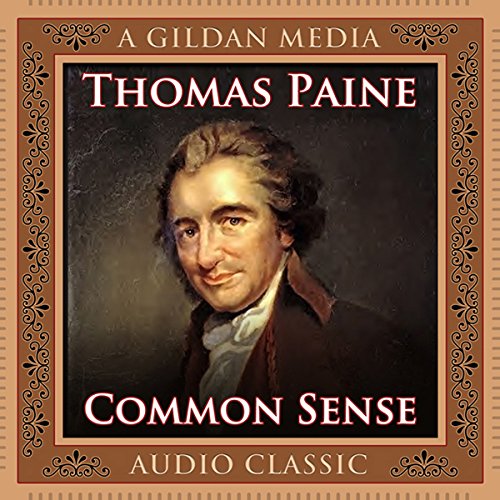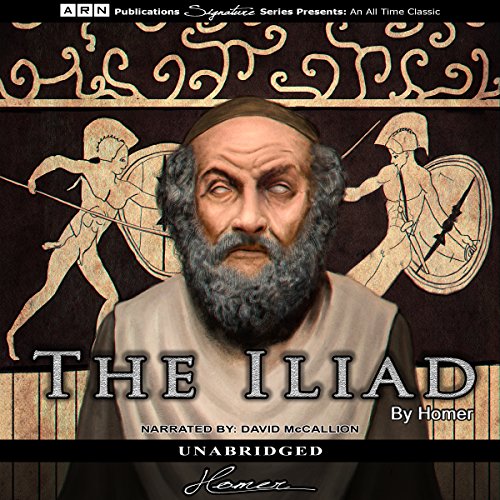
 Audible sample
Audible sample  Playing...
Playing... 
 Paused
Paused  Your audiobook is waiting!
Your audiobook is waiting!
Enjoy a free trial on us
$0.00$0.00
- Click above for unlimited listening to select audiobooks, Audible Originals, and podcasts.
- One credit a month to pick any title from our entire premium selection — yours to keep (you'll use your first credit now).
- You will get an email reminder before your trial ends.
- $14.95$14.95 a month after 30 days. Cancel online anytime.
Buy
-13% $1.25$1.25
The Iliad
 Audible Audiobook
– Unabridged
Audible Audiobook
– Unabridged
The Iliad is one of the two great epics of Homer, and is typically described as one of the greatest war stories of all time, but to say the Iliad is a war story does not begin to describe the emotional sweep of its action and characters: Achilles, Helen, Hector, and other heroes of Greek myth and history in the tenth and final year of the Greek siege of Troy.
- Listening Length14 hours and 8 minutes
- Audible release dateJuly 1, 2019
- LanguageEnglish
- ASINB07TV7P4K1
- VersionUnabridged
- Program TypeAudiobook
 Read & Listen
Read & Listen
Get the Audible audiobook for the reduced price of $7.49 after you buy the Kindle book.
People who viewed this also viewed
- Audible Audiobook
- Audible Audiobook
- Audible Audiobook
- Audible Audiobook
- Audible Audiobook
People who bought this also bought
- Audible Audiobook
- Audible Audiobook
- Audible Audiobook
- Audible Audiobook
- Audible Audiobook
Related to this topic
- Audible Audiobook
- Audible Audiobook
- Audible Audiobook
- Audible Audiobook
- Audible Audiobook
Product details
| Listening Length | 14 hours and 8 minutes |
|---|---|
| Author | Homer |
| Narrator | Charles Purkey |
| Whispersync for Voice | Ready |
| Audible.com Release Date | July 01, 2019 |
| Publisher | Page2Page |
| Program Type | Audiobook |
| Version | Unabridged |
| Language | English |
| ASIN | B07TV7P4K1 |
| Best Sellers Rank | #110,704 in Audible Books & Originals (See Top 100 in Audible Books & Originals) #33 in Epic Poetry (Audible Books & Originals) #402 in Epic Poetry (Books) #668 in Fairy Tale Fantasy (Audible Books & Originals) |
Customer reviews
Customer Reviews, including Product Star Ratings help customers to learn more about the product and decide whether it is the right product for them.
To calculate the overall star rating and percentage breakdown by star, we don’t use a simple average. Instead, our system considers things like how recent a review is and if the reviewer bought the item on Amazon. It also analyzed reviews to verify trustworthiness.
Learn more how customers reviews work on Amazon-
Top reviews
Top reviews from the United States
There was a problem filtering reviews right now. Please try again later.
Given that with Verity the reader is "getting something that hews quite closely to the original" for a variety of reasons, and despite that it's "not the finest English poetic rendition" but "may well be the best way for an Enflish (sic) language reader to best approach the real heart of the Iliad," I would suggest that it is, in fact, close to perfect for the first time reader. In my opinion, it's also impressive for those already familiar with the poem, both in the Greek and in other translations.
Also, I would recommend that first time readers avoid like the plague both Fagles' and Mitchell's versions, the former vastly overwritten and the latter vastly underwritten. That's not to say that Fagles and Michell have produced unreadable versions, but both are very definitely "based on" the Greek text as opposed to being an attempt to faithfully reproduce the Greek text into English, which is what Verity is attempting and largely succeeds in doing. For what it's worth, I admire both the Fagles and Mitchell versions.
Lattimore's translation comes closest to Verity's in form and spirit and is venerated, justly, by many, but I prefer Verity's on the grounds that it's less cumbersome in expression, a fault which Lattimore falls into surprisingly often, and Verity seldom makes straightforward translation errors, which crop up in Lattimore more often than one might expect.
My only serious objection to Verity is that he frequently alters the expression of what are verbatim repetitions in the Greek, almost as if he were trying to disguise the immense volume of such occurences in the original.
However, if I were recommending a translation for first time readers, Verity's would come first with Lattimore's a close second.
By the way: the Iliad is ancient gay angst. Nobody ever told me that part before (and it is The Entire Part, Really) but if I'd known that I would have read it a lot sooner. So there you have it.
This has to be THE story about (classic) heroism, duty, and ancient warfare; it is also one of the mythology must-reads. I really wanted to read the verse version but I settled for this (decent) prose translation.
From the last time I read this (high school, more than 20 years ago) I gotta say it was very good to remember this story. Diomed, Hector, Achilles and even Priam are very well written characters, who are interesting and seem to have real motivations, fears and emotions. Also, I didn't really remember the timeline of the story. It begins with the quarrel between Achilles and Agamemnon, and ends with Hector's funeral. The fragility of my memory plus Hollywood taxed my perception of this in particular.
The only drawbacks from the book I think is the astounding level of genealogic detail. Most of the time you will skim over long paragraphs of names that you really won't ever remember, let alone their forefather's names. That really cuts the flow of the book. Some people will perhaps love this, but I think it detracts from the (modern) readability of the book.
I think I will re-read this again in 20 years, to see if my memory of the story has improved, or perhaps the 100th Hollywood interpretation of the story will have erased completely the fantastic "original" storyline.
Re-read this girls and boys. You will enjoy it, provided you don't get bored in the genealogy trees.
Top reviews from other countries
This year I've decided to dive deep into the mythology of the ancient world: a form of literature that changed our art and history as we know it. Next up are the critical editions of Indian Itihasic epics. But I decided to tackle the relatively short epics of the Greek and Sumerian worlds.
And boy was I blown away. For modern readers who enjoy stuff like Harry Potter or other fantasy/mythology stuff, this may honestly be a tough story to get into. Ancient mythology often digress, very frequently, to subplots that may not be related to the core story. For example, when a soldier is killed, Iliad goes on a short tangent to explain their backstory.
At first this seems nonsensical, especially for us modern readers who are used to sharp, to the point stories. And who live in a time of people with short attention spans. But it is totally the opposite: Greek mythology is an intricate, dense epic with vast arrays of characters, mortal and immortal, who are connected in complicated alliances or enemities. A relationship two characters may have can have serious repurcussions later in the story. A minor character whom you thought minor may not be what they seem.
Even we ignore the last context, it feels EPIC to give importantance to minor insignificant detail since these fill the story with meaning, making you believe that this truly is happening right in front of you. The book gives a detailed catalog of all the alliances and contingents: something that modern writers will refrain from, without knowing this might add a juicy flavor to their stories.
Having read my fair share of fantasy epics, I know how one walks a thin line when writing in a detailed fashion, with many digressions. This is an issue I seemed to have with writers like Sanderson or Jordan. What makes Iliad different is that it details only on the things that are important. It doesn't waste time describing architecture or places but instead words are spent on beautiful descriptions of lineages, armors, shields, and alliances.
Homer's epics are also famous for their use of simile. Like calling someone "Swift footed" or "Godlike" when mentioning someone. Or giving examples like comparing the veracity of a hero's attack to that of a lion attacking a herd of sheep. Homer ensures he can use simile any where he can. It makes the experience enrichening, powerfully imaginative. I still wonder why modern writers don't try to be this poetic?
The intricate ways all the subplots simply collide over each other gives a lot of entertainment and even a philosophical insight into human nature. It is no surprise that Greek philosophy often takes Homer's epics as examples to ponder over philosophies like ethics, aesthetics, politics, etc. which have essentially single-handedly impacted whole of western thought.
When looked through a modern lens, there obviously are many ethical issues. All characters, good or bad, approve of slavery (including Achilles). But this is obviously an incorrect approach. The story needs to be enjoyed taking into consideration the time it was written in, when things like slavery were totally acceptable in many ancient societies.
It still feels breathtaking to see the representation of many moral, philosophical issues that remain relevant today. War and Revenge are Iliads primary themes and the insurmountable tragedy they cause may remain forever relevant. The absolute poetic prose brings you closer to the characters.
Eg: there is this particular scene where Andromache begs her husband Hector to come back alive from the war, beging that since she lost all of her family, Hector was a husband, father, brother, sister and mother to her, all of it. Despite the ugly fact that it was his family that sacked and destroyed her home, I was still moved by this astonishingly poetic statement, which also helped me care for Hector.
All in all, this is one of the most pulse pounding, thrilling epics I've read. And it comes as no surprise to me why it has stood the test of time!
The Hero who made this journey is Aeneas, a descendant of the King of Troy, who will experience many adventures before arriving in Italy. The book provides a good idea of the human beings' life, habits and feeling in the 8th Century before Christ.












![A Tale of Two Cities [Tantor]](https://m.media-amazon.com/images/I/51Ecc++n0tL.jpg)



![The Scarlet Plague [Classic Tales Edition]](https://m.media-amazon.com/images/I/61FhtSpkE8L.jpg)


